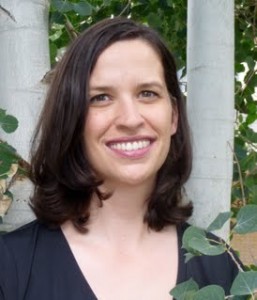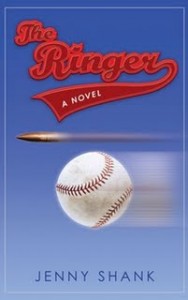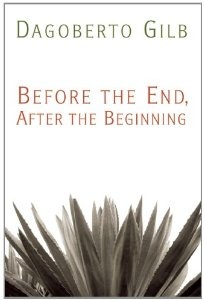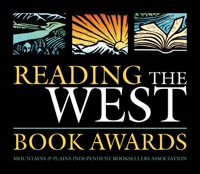 Just about every writer in the American West has heard the name Jenny Shank. Her tireless and steadfast work as a reviewer and literary newshound, especially as the Books & Writers Editor at NewWest.net, has made her both a beacon and a lodestone to readers and writers of the many divergent strains of Western literature. If it’s literary and comes from the West, chances are good that Jenny Shank has read it, written about it, or told you that it’s coming down the pike.
Just about every writer in the American West has heard the name Jenny Shank. Her tireless and steadfast work as a reviewer and literary newshound, especially as the Books & Writers Editor at NewWest.net, has made her both a beacon and a lodestone to readers and writers of the many divergent strains of Western literature. If it’s literary and comes from the West, chances are good that Jenny Shank has read it, written about it, or told you that it’s coming down the pike.
But all along, Shank has been a writer too. While building up NewWest.net’s presence in the book world she also published work in Alaska Quarterly Review, Image, McSweeney’s Internet Tendency, and Prairie Schooner. Now her first novel, The Ringer, has been published by Permanent Press. It tells the story of two Denver families at the turn of the millennium—one of a Mexican immigrant killed in a case of mistaken identity, and the other of the cop who shot him—who come into inevitable conflict over their shared passion for baseball. We talked about writing, juggling kids, the grunt work of self-publicizing, and the role of the reviewer in contemporary literary culture.
Interview:
Steven Wingate: Did all the debut books you’ve reviewed and all the first-time author interviews you’ve done prepare you for your first book experience, or were you blindsided by it the way most debut writers are?
Jenny Shank: The main thing I was blindsided by was the fact that this happened—at long last, my novel is being published. I wrote an essay for the January/February issue of Poets & Writers about this called “The Ham-and-Egger,” about how I’d almost given up—or at least considered going on hiatus until my kids were bigger—when happily I found an agent and publisher. I hope I don’t ever take this for granted, because I have friends who are talented, committed writers, and they don’t have books published yet, and because of that, some people in their lives don’t take what they do seriously. But I do—they are true artists, continuing to work on improving their craft despite limited recognition for what they do.
 But I think your question is more about what I’ve learned from being able to talk to other writers. I’d say that overall, my first book experience has been a quiet one. The Ringer is being published by The Permanent Press, which publishes about twelve to fourteen books a year. Maybe one advantage I had was that because I’m with a small press, I knew I’d have to do a lot on my own—I set up my own website and social media efforts, set up my own readings in bookstores, and I’ve tried to find people to review the book. I have talked to a few writers who weren’t aware that they needed to be that active. You have to set up your own website and stick your email on it so anybody can contact you, and you build a relationship with readers. My website is not as pretty as some, but very few of us can be Mohammed Ali, nimble and pretty. I’m happy with it just being nimble.
But I think your question is more about what I’ve learned from being able to talk to other writers. I’d say that overall, my first book experience has been a quiet one. The Ringer is being published by The Permanent Press, which publishes about twelve to fourteen books a year. Maybe one advantage I had was that because I’m with a small press, I knew I’d have to do a lot on my own—I set up my own website and social media efforts, set up my own readings in bookstores, and I’ve tried to find people to review the book. I have talked to a few writers who weren’t aware that they needed to be that active. You have to set up your own website and stick your email on it so anybody can contact you, and you build a relationship with readers. My website is not as pretty as some, but very few of us can be Mohammed Ali, nimble and pretty. I’m happy with it just being nimble.
One thing agents and editors tell new writers is to develop a “platform,” something of a cross between a clear readership demographic and a virtual space in which people can find you. Did having such a definable Internet presence change the way you approached putting out your manuscript and, later, your book?
That’s a good question. I guess I’ve never thought of myself as being well known. I don’t have a sense of how many people read the articles I write for New West. I have noticed, though, that writing for New West and having one stable hub on the Internet has made me more findable to people who share my interests than I was during years I wrote book reviews for the Rocky Mountain News and was the Denver editor of The Onion. People who have an interest in the literature of this region contact me and let me know about books and literary events, and I’m happy to hear from them—they help me do my job.
I know that my agent mentioned my journalism career when he was sending around my manuscript to editors, but if I have a “platform” of any kind, it obviously didn’t sway anyone! The Permanent Press doesn’t care if you have a platform or not. Martin Shepard, the publisher, recently wrote on his blog about one novelist he’s published whose book received great reviews but only sold 450 copies. But Martin said he admires this writer’s work so much that he’s going to keep publishing his books.
Having a platform might be especially important for nonfiction writers, but it can be beneficial for literary fiction writers, too. I think the literary fiction writers who have the best “platforms” in a very broad definition of that term are those who spend a lot of time helping other people. Examples of this are Dave Eggers, with his many different publishing ventures and charities or Hannah Tinti, who founded One Story and has helped many writers find an audience over the years, and in turn benefited from an eager audience when her books were published. Or Edwidge Danticat—I think practically everything I know about Haiti comes from her stunning books. She has been an advocate for Haiti, and frequently writes and comments on radio or television about her native country. There are several writers who are known for being wonderful teachers, such as William Kittredge and Steve Almond, and this I’m sure generates a lot of interest and goodwill when their books are published.
It could seem daunting to try to help others on as grand a scale as these writers have, but anyone can start on a small level—say, apply it to your Twitter feed. Instead of talking about yourself, talk about other people’s books, participate in #fridayreads, tell jokes, point out interesting websites, answer people’s questions. Then if you slip in something about how your book just got a great review, or how you have a reading coming up, no one wants to cold-cock you.
We’ve done an AWP panel together called “To West or Not to West” that focused on various ways that writers based in the West deal with (or choose not to deal with) the mythos of the region. The Ringer takes place in an urban environment and avoids the Western mystique, but I noticed that your acknowledgment page ends with ”And Denver, I love you.” How does the West and “Western-ness” play into the novel?
 The West is many different things, but I guess if you asked someone who didn’t read a lot of contemporary books set in the West what they thought a western novel would be like, they’d imagine horses and cowboys, or at the very least outdoorsy adventure type stuff like the stories in Pam Houston’s Cowboys Are My Weakness. But there are plenty of big cities in the West. One of my favorite writers of the urban West is Dagoberto Gilb, who portrays city life in Texas and California with candor, humor, and grit, while still giving his stories a significant “western” flavor.
The West is many different things, but I guess if you asked someone who didn’t read a lot of contemporary books set in the West what they thought a western novel would be like, they’d imagine horses and cowboys, or at the very least outdoorsy adventure type stuff like the stories in Pam Houston’s Cowboys Are My Weakness. But there are plenty of big cities in the West. One of my favorite writers of the urban West is Dagoberto Gilb, who portrays city life in Texas and California with candor, humor, and grit, while still giving his stories a significant “western” flavor.
Western-ness plays into The Ringer in a number of ways. Being located in the West shapes the demographics of the city of Denver, whose population is one-third Latino (mostly Mexican-Americans). The land that the state of Colorado was formed out of is roughly one-third Mexico territory, one-third Texas territory, and one-third Louisiana Purchase land. There are Latino families who have lived in Colorado continuously since it was a part of Mexico. My character Patricia Maestas comes from this kind of a long-standing Colorado family.
The West doesn’t have as fraught a history of race relations as does the American South or cities such as Boston or Chicago. But if you look into the history of Denver, there are moments where race relations became tense, such as during the late ’60s and early ’70s, when Chicano activists protested for their rights, and Denver was a hub of that activity (in my novel, the characters Lupe and Tío Tiger were actively involved in the protests of that era).
The Ringer was inspired by the 1999 shooting of Ismael Mena by the Denver police—in that case, as in my novel, the cops enforced an immediate entry warrant (a no-knock raid) at the wrong address. This incident gripped me in part because in its wake, race relations in Denver became tenser than I’d ever seen them in my lifetime.
Toni Morrison has said that she wrote the kind of books she wanted to see, books that she didn’t see being written by others. I don’t see a lot of literary novels being written about Denver, or the urban West, and so I wrote my own. And I absolutely had to express my love and appreciation for my hometown of Denver in the acknowledgments—I’ve been waiting a long time to do that!
The novel is set in Denver during an un-named year at the turn of the 21st century. (I know it isn’t today because a few landmarks have shut down or changed names.) Why did you set the story in the recent historical past rather than in the present, and what flexibility did you gain?
I’d like to say that I ruminated on this decision and carefully chose the perfect year to set it in for brainy structural reasons, but the truth is that I worked on the book for eight years, and it’s set around when I started writing it. As I mentioned, I was inspired by a 1999 shooting in Denver. I set the book in the year 2000—I think I started writing it in 2002. I wanted it to reflect Denver as it existed at that time, because a number of policies and laws were changed in response to the outrage that shooting caused. For example, no-knock raids are now outlawed in Denver—or at least are extremely rare now. There were also a couple of plot details that only worked if I set it in 2000—for example, the fact that Salvador moves pretty freely between Mexico and America, even before he had citizenship. After 9-11, that changed. Also, I thought the simplest way for Salvador to have been granted U.S. citizenship was through the 1981 amnesty that made it possible for farm workers to gain citizenship, so I needed to make his age and the dates match up with that year.
You alternate your narration between two characters that appear to be alien to you—a male police officer and a Latina mother who got married before she finished college—and you’re in close third person on both of them. How did you get to know them?
Ed and Patricia do seem like they’d be alien to me if you compare the details of their lives to mine, but the truth is that I feel close to them. Although these characters are both completely fictional, they grew out of my experiences.
 Growing up, I attended Denver Public Schools during the era of court-ordered busing for integration. Many white families left the district, but mine stayed, so starting when I was six years old, I rode a bus about thirty minutes away from my home to neighborhoods that were completely different from mine. Sometimes I attended schools that had a majority Mexican-American population, other times I went to schools that were mostly black. This taught me that there are always two sides to any story, if not ten, so that’s why it felt comfortable for me to split the narrative of The Ringer into two perspectives.
Growing up, I attended Denver Public Schools during the era of court-ordered busing for integration. Many white families left the district, but mine stayed, so starting when I was six years old, I rode a bus about thirty minutes away from my home to neighborhoods that were completely different from mine. Sometimes I attended schools that had a majority Mexican-American population, other times I went to schools that were mostly black. This taught me that there are always two sides to any story, if not ten, so that’s why it felt comfortable for me to split the narrative of The Ringer into two perspectives.
I didn’t do much research for Patricia, apart from a few details I included on her job as a nurse; I felt I knew her well. She could have been any of the girls I went to school with. I also spent a lot of time in the area of north Denver where she lives when I started writing the book, because for six years I mentored a girl who lived in that neighborhood. I did have to research some details about Patricia’s husband Salvador—he’s a Mexican immigrant, and that experience is foreign to me, but Patricia seemed like a regular Denver girl like me.
 For the Ed sections, I did a lot of research on everything that had to do with police. My cousin’s husband is a cop in Omaha, and his stories were helpful to me. I’d meet cops periodically, and just start talking to them. Once at a wedding, I met a woman whose dad was a cop in San Francisco, and we just started talking about what it was like when she tried to start dating—I got a fun scene out of that. I read a lot of books and I pored over the newspaper, collecting articles about different cases. I spoke to Mike Mosco of the Denver Police Protective Association about the procedures followed after an officer-involved shooting. But Ed himself—his love for his family and in baseball, was something I derived from observation and experience.
For the Ed sections, I did a lot of research on everything that had to do with police. My cousin’s husband is a cop in Omaha, and his stories were helpful to me. I’d meet cops periodically, and just start talking to them. Once at a wedding, I met a woman whose dad was a cop in San Francisco, and we just started talking about what it was like when she tried to start dating—I got a fun scene out of that. I read a lot of books and I pored over the newspaper, collecting articles about different cases. I spoke to Mike Mosco of the Denver Police Protective Association about the procedures followed after an officer-involved shooting. But Ed himself—his love for his family and in baseball, was something I derived from observation and experience.
You’re a mother of two young children—four and two—and that has to affect your writing time. How long have you been working on The Ringer? Did your working habits change with parenthood, were you able to sustain your practice just as you had before?
I started writing The Ringer about four years before my four-year-old daughter was born. Before she arrived, I was able to finish a draft that had all the chapters in it and most of the significant plot details in place. I took some time off, and then I revised that draft during the two years before my son was born. I’d just about given up at that point. I thought, here I am with two kids, several freelance jobs, and no childcare—maybe I’ll take a break from writing for a while. But I’ve always been good about submitting work regularly—rejection doesn’t bother me any more, unless there’s something unusually sadistic to the rejection. So I found the time to send query letters to agents and signed with an agent when my son was three months old. My agent started submitting the book, and he found a publisher for it. Judith and Martin Shepard, my editors at The Permanent Press, wanted me to make some subtle changes to the ending. They were right about those changes. I think I’d be finishing up a draft every time I was nine months pregnant and I’d kind of crash land the ending. So that gave me an impetus to get myself back to work, even with such limited time.
I work only in very small increments when I can get my kids to take a simultaneous nap or my daughter is at preschool and my son is asleep. That gives me one to two hours a day, at most, and I also have to squeeze in writing two or three articles a week and editing New West’s book page so I can make some money! But I find that having such a short time period in which to work reduces my procrastination. I’m all about the power hour.
FWR recently ran a series on the role of the critic in contemporary letters. (See tag: criticsm). As someone who works both sides of that divide, do you have anything to add to that conversation?
I’ve been publishing book reviews and author interviews for over a decade now (mostly for the Rocky Mountain News, The Onion A.V. Club, Dallas Morning News, Boulder Daily Camera, and New West).
I started writing book reviews for the Rocky Mountain News right out of college, because I like to think about the book I’ve just read for a while before jumping into the next book. Writing book reviews makes me an attentive reader, and most of what I know how to do as a fiction writer I’ve learned from careful reading. (I think Francine Prose’s Reading Like a Writer is one of the best writing guides there is.)
When I started out as a book reviewer, I didn’t have a mission in mind. I was assigned the books I wrote about for Rocky Mountain News, so although I always tried to be fair and judge each book on its own merits, I wrote some negative reviews. Now that I choose the books that I’m going to review, I only review books that I can recommend—I might offer some criticisms, but I’m only going to review a book if I think it’s worth a reader’s time. I review about fifty books a year for New West—why waste any of those slots on tearing a book down?
And now at New West I think of myself as having a mission: drawing attention to the fine writers of my region, a region I think tends to be ignored by the national press and that now has very few press outlets covering its books. Someone on Twitter called me “the last standing book reviewer in the Rocky Mountain region,” and there are a few others out there, but not many—the Boise Weekly, for example, runs some good book coverage in Idaho.
The Rocky Mountain News had a great books section, and that paper is gone. A few months ago, the Denver Post cut back its book coverage and let go of its book editor, and now it runs just a few locally written pieces, alongside wire stories, mostly from the Washington Post. I love the Washington Post Book World, but it kind of sucks that if you’re a writer in Colorado and if Washington Post passes on covering your book, there’s a good chance that nobody in Colorado will be able to hear about it. (I imagine this is true of a lot of states, not just Colorado.) So my mission is to keep these books from being ignored. The newspapers and magazines that still have big book review sections may not care about the Rocky Mountain West, but the people who live here do, and they like to read books set in this region. Maybe there aren’t a lot of people who care about this, but I do, and I’m writing book reviews for those kindred spirits out there who love the contemporary literature of the American West like I do.
How is your writing going with the first book out?
Right now I’m only able to work on revisions, short stories, and essays. I want to write another novel, but I don’t have big enough chunks of time to work on it. I think when my daughter is in kindergarten and my son is in preschool, that will be a good time to start a new novel. I don’t want to complain, though—I am enjoying this time of my life, looking after my kids, and I am patient toward it. I’m working on a short story collection and I’ll start the next novel when I find the time.









